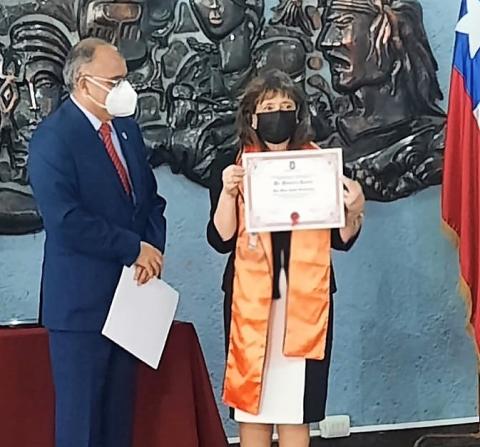
As part of the commemoration of its 40th anniversary, the University of Tarapacá (UTA) awarded with the degree of Doctor Honoris Causa to the director of Cedenna, Dr. Dora Altbir Drullinsky, “in recognition of her valuable contribution to national and international scientific research in the field of Nanoscience”.
The ceremony was held in the central house, in Arica city, in the presence of the members of the Board of Directors and the academic body of the UTA.
The ceremony was headed by Emilio Rodríguez Ponce, rector of the UTA and also had the presence of the rector of the Universidad Católica del Norte, Rodrigo Alda Varas.
In his presentation, the rector Rodríguez recalled that Dr. Altbir completed her primary and secondary studies in Arica, and then he reviewed her academic career until reaching the National Prize for Exact Sciences in 2019.
“We are in the presence of one of the most relevant scientists in the country, but also a very committed and dedicated person, who contributes to the development of science as well as optimizing the contribution (of these disciplines) to the country, seeking greater development and improving people's lives ”, he pointed out.
Likewise, he listed his participation in additional tasks, such as the presidency of the Higher Council of Sciences of Fondecit, the Higher Education Accreditation Commission (CNA), the Institute of Physical Sciences and Astronomy, and the National Academy of Sciences, "activities that they surpass her performance as a scientific and academic researcher and show her generosity towards the country ”. "For us it is a privilege to grant him the highest distinction of our university," concluded the rector Rodríguez, then handing over to the director of Cedenna the diploma, ribbon and medal that certify this condition.
Better education and support for scientific development
In her intervention, Dr. Altbir thanked the honor on behalf of all those who carry out research in Chile and underlined that “science is not only a great cultural adventure that allows us to understand the universe: it also gives us practical results that transform the world, creating and adapting new technologies. (…) Science allowed many countries to become developed, cultured and self-sufficient nations. And that is what Chilean scientists want to happen in our country. We want to be a thinking society to be masters of our destiny ”, she stressed.
Likewise, he highlighted the role of state universities: "We academics come to the University to teach, but also to develop new knowledge, contribute to the development of a better and more equitable society, but - above all - to train people who transform our country. Topics such as the relevance and impact of our activities, and many others must be in our DNA, with seriousness and responsibility, with excellence and humility. Only in this way will we be able to open the best opportunities to our students, and make them better professionals for Chile and the world of today ”.
And she finally made a call to improve the institutional framework in terms of scientific development: “s humanity, we are facing enormous global challenges; lack of water, increasing energy needs, scarcer natural resources, and now covid. To solve them we will have to work multidisciplinary, physics, biology, engineering, medicine together to address the problems in a different way than we have done until today. Social sciences are also becoming more relevant every day, as we have to understand how new technologies will impact our lives. We are facing a period of great change, not only in nature but also in the way we will live and the kinds of jobs we will have in the future. Only by working all the disciplines together can we aspire to many more years of humanity ”.







